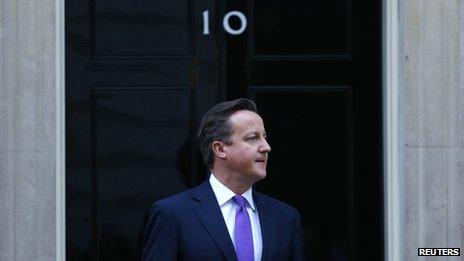Cameron: No more dotting of 'i’s'
- Published
- comments

There is a paradox in David Cameron's speech to the business lobby group, the CBI - excerpts from which were published in advance last night.
His main theme is the imperative for the government of putting the promotion of economic growth at the heart of everything it does, to re-engineer the British economy so that it does not stagnate in a Japanese way forever.
He says that the UK "is in the economic equivalent of war today" - and therefore the spirit of the World War II must be recreated in Whitehall.
Here is the intellectual heart of his address: "We need to forget about crossing every 't' and dotting every 'i' - and we need to throw everything we've got at winning in this global race."
He elaborates: Consultations, impact assessments, audits, reviews, stakeholder management, securing professional buy-in, complying with EU procurement rules, assessing sector feedback…this is not how we became one of the most powerful, prosperous nations on earth. It's not how you get things done. So I am determined to change this…"
Taken at face value, that is a radical statement to make to civil servants. He appears to be saying that bureaucratic mistakes will be forgiven, if the relevant bureaucrats make the mistakes to promote British prosperity.
Really?
For what it's worth, there is a fascinating test case of this spirit of forgiveness for errors made to improve the productivity of the UK: the botched awarding of the West Coast Mainline to FirstGroup.
The civil servants suspended for this booboo could argue that, in stripping Virgin of the franchise, they showed that competition is a reality in rail, which is good for growth. And they might well say that they were only trying to maximise proceeds for the taxpayer, to reduce the government's hideous deficit - also good for growth.
Unfortunately what they didn't do was dot the "i's" and cross the "t's" when creating and using the Department for Transport's complicated economic model for assessing franchise bids - which meant that in a judicial review of the Department's decision to go with First Group, launched by Virgin, the current holder of the franchise, the government was bound to lose.
So the transport minister was forced to perform a humiliating volte face and go back to the drawing board - at a cost for the taxpayer which may well run to hundreds of millions of pounds.
In that case, David Cameron - surely - would have wanted those "i's dotted and the "t's" crossed.
But here's a funny thing - which I am sure is a bit of a coincidence.
In order to get growth going by minimising delays to the awarding of big contracts of economic significance, the prime minister wants there to be fewer judicial reviews (there were 11,200 judicial reviews last year, up from just 160 in 1975).
Mr Cameron wants to increase the charges for bringing a review, so that "people think twice about time-wasting" (Virgin does not think it was time wasting, by the way). And Mr Cameron wants no one to have the right to appeal a decision in this way more than twice, a halving of the current maximum number of appeals.
Now the theory is that delays to building fast-track rail lines through countryside or new runways in residential areas of the south east would shrink - creating jobs in the short term and improving productive infrastructure in the medium term.
Oh, and by the way, presumably it won't take quite as long to deport suspected terrorists.
All of which you either regard as a belated dose of common sense, or as a fearful trampling on individual liberties. You decide.
But here's the paradox I mentioned. The reform of the judicial review system will only happen after a "public engagement exercise on the plans", followed by "consideration of the responses". In other words there will be a review of the decision to curb the growth of judicial reviews - which sounds like dotting the "i's" and crossing the "t's".
It will be fascinating to see how and whether the prime minister's growth-promoting judicial-review changes survive the scrutiny of Whitehall. Will his war on "i-dotting" be stymied by "t-crossing"?